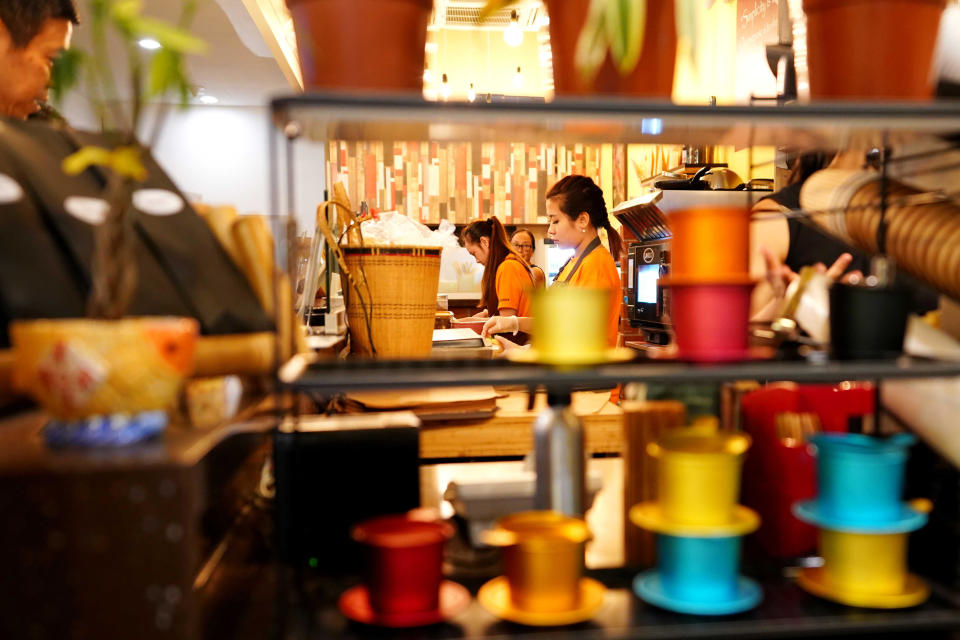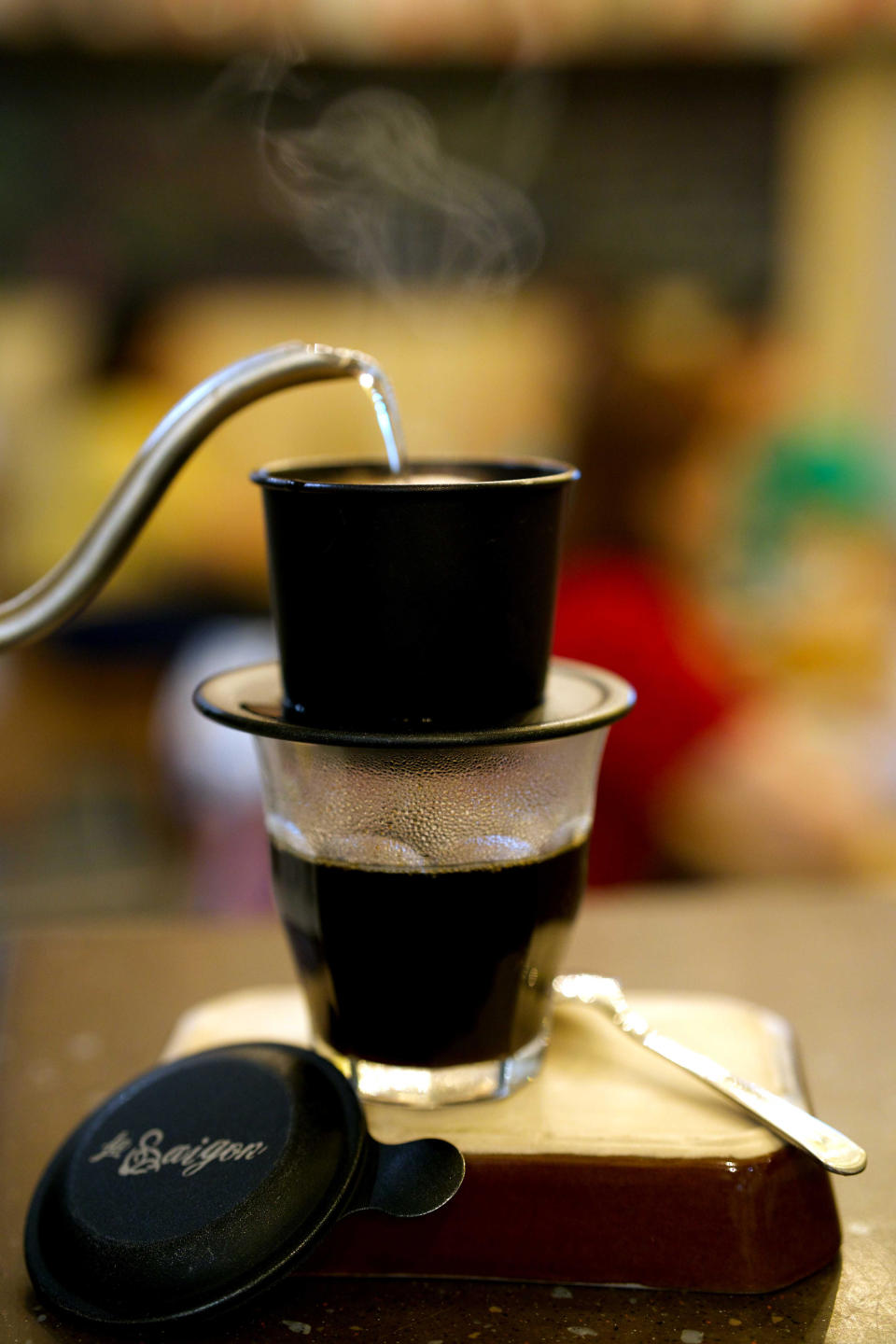INTERVIEW: Ly Bui, Q-Grader and founder of La Saigon on championing Robusta coffee beans

SINGAPORE — In case you didn't know, third-wave coffee culture is the latest Western import to hit our sunny shores, and by the looks of it, it's not about to go away anytime soon. According to Perfect Daily Grind, increasing coffee quality, more direct trade, a greater emphasis on sustainability, lighter roast profiles, innovative brew methods – these are all intrinsic to third-wave coffee. Look no further than Jewel Coffee, The Coffee Academics, and Alchemist to see first hand the rapid reach of third-wave coffee in Singapore.
READ MORE:
Food review: At Restaurant Beurre, where the food is robust, delicious, and drop-dead gorgeous
Food review: The menu at Tablescape is uncomplicated but brimming with deliciousness
Eat like a local: The A to Z guide of Singapore’s most iconic local, hawker and specialty foods
Aaron Kwok credits his youthfulness to a skin routine that he has stuck to religiously for 24 years
Amidst this furore, Ly cuts a lone figure as the only Vietnamese Q Grader in Singapore that specialises in Robusta beans—coffee beans that mostly grow in Vietnam, the second-largest exporter of coffee beans in the world and the leader of Robusta beans export. She champions the appreciation and education of the oft-maligned Robusta and takes it upon herself to see to it that this coffee from her country of birth stands shoulder to shoulder with the more familiar Arabica.
I meet her at Alexandra Central Mall where she runs La Saigon, her homage to Vietnamese food and beverage, as we chat over Banh Mi, Spring Rolls, and, of course, piping hot cups of fragrant Robusta coffee.

Zat Astha: What does a Q grader do?
Ly Bui: The Q Grader Programme is the coffee industry's most recognised and coveted certification system for Arabica and Robusta cuppers. The Coffee Quality Institute certifies Q graders and provides a common language for discussing coffee quality throughout the coffee chain from producers to buyers. We are given the authority to find the grade of coffee. Anything above 80 is a speciality coffee; anything below is relegated to more commercial use. Sometimes the beans will have faults such as a distinct plastic smell or contain a lot of insects. My job is to weed these defects out and find the best coffee beans in the harvest.
How did you get started?
Before this, I was working in Real Estate, focusing mostly on Southeast Asian markets. After that, I moved to Far East Organisation before starting work at GuocoLand. I was educated in Singapore, and now I'm a citizen. I've lived 20 years of my life in Singapore. I'm not doing very much of Real Estate anymore. This is my focus now. Sometimes when life takes a turn for you, you have no choice but to follow (laughs).
How did you become interested in coffee?
When I worked in Vietnam, I had a friend who was very interested in coffee. Sometimes we sit, and we drink Italian coffee, and he would get angry because the Italian don't grow their beans, but they know how to make such a perfect cup of coffee. Vietnam is the second-largest exporter of coffee, but all we do is make instant beverages with our beans. I don't think that's right.

Why is that?
I think it's the knowledge of the farmer. They don't know how to grade the coffee, so that's where people like me come in. I have a friend who owns a coffee farm, so I went to him and said "Look, your coffee is of high value." With that knowledge, he now knows the exact price that he can sell his coffee. The maximum grade I can give is 100—but I've never seen any beans at this level. The best I've given so far is 87. Some traders who don't know anything about coffee beans will lump your entire production together regardless of grade and falsely declare your harvest inferior. But now, with Q-graders such as myself, we can finally have great tasting Robusta beans coming out of Vietnam.
I read that Vietnamese coffee bean farmers tend to overwater and over fertilise the land. Is that true?
That's probably true in the past. The trend now is to take care of your harvest. Sometimes in the farms, you can see butterflies and bees. This is an excellent indication that your coffee beans are very well taken care of. I won't go so far as to say it's organic, but these farmers try their very best to keep the harvest in its optimal condition.
Do you think Robusta beans are better than Arabica beans?
Oh, no-no. Everyone's palette is different. There are a lot of Singaporeans who come back here for Robusta beans because they don't like the sourness of Arabica beans. On the other hand, some Australian tourists prefer Arabica beans because it's light, fruity and more acidic. There's no right or wrong. What's important is how you find the beauty in each type of beans. Of course, some people refuse to even go anywhere near a Robusta. It's mostly a preference that has been brought down by the generations. Most people start their life's coffee journey at Starbucks that use Arabica beans exclusively. There are even people who still insist on washed beans. In nature, coffee beans are unwashed.
In the case of Robusta beans, they are hand-picked and sun-dried. It takes roughly one month for the bean to dry out. To me, I feel that beans treated this way are sweeter and more full-bodied. But washed beans are immediately rinsed at the point of harvest and take only three to four days to be fully processed. Yes, your coffee might taste very clean, but it's also devoid of all the good nutrition that comes with a more natural harvesting process.

Why do you think people are not well-informed about coffee beans in Vietnam?
Once again, it boils down to the level of education. Vietnam is a largely agricultural country. We don't talk a lot about the value of the foods we grow. For example, the fruits we grow is very good, but you don't see a lot of it being exported out. Even in Vietnam, most of the coffee drinkers here don't know what type of coffee beans they're drinking or have ever tasted one that is of high quality. Most of the beans in Vietnam are mixed with soybean, corn, margarine, and chemicals. It is just not something the locals concern themselves with. To them, coffee is just a beverage they drink casually at coffee shops.
How would you define a good cup of coffee?
Good coffee must be consistent in its fragrance and taste regardless of temperature; the entire cup is enjoyable from start to finish. That's the sign of a finely-brewed cup of coffee. It shouldn't taste empty or bitter halfway through. In Vietnam, people drink their coffee with a lot of evaporated milk because they want to mask the bitter taste that comes from inauthentic beans. It shouldn't be like that. I want people to know that Robusta beans are equally superior to Arabica. That's the mantle I want to take up.


